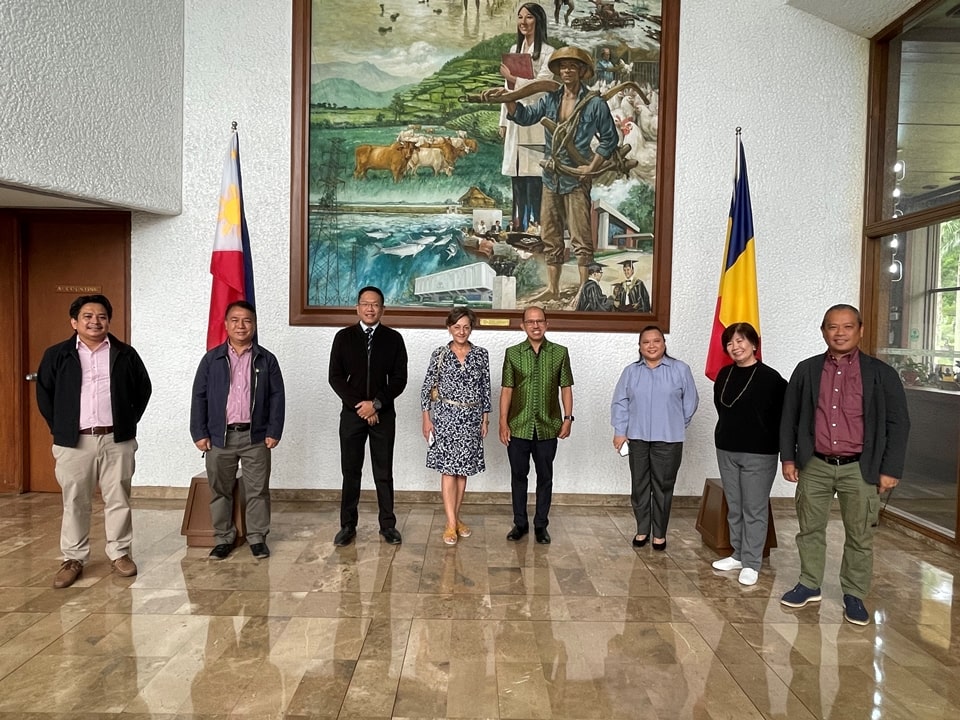 Romanian Ambassador Her Excellency Răduţa Dana Matache (fourth from left), Dr. Glenn B. Gregorio (fourth from right), SEARCA Director, and Assoc. Prof. Joselito G. Florendo (third from left), SEARCA Deputy Director for Administration, together with members of the SEARCA Executive Committee.
Romanian Ambassador Her Excellency Răduţa Dana Matache (fourth from left), Dr. Glenn B. Gregorio (fourth from right), SEARCA Director, and Assoc. Prof. Joselito G. Florendo (third from left), SEARCA Deputy Director for Administration, together with members of the SEARCA Executive Committee.
Her Excellency Răduţa Dana Matache, Ambassador of Romania to the Philippines, visited the Southeast Asian Regional Center for Graduate Study and Research in Agriculture (SEARCA) on 12 April 2022.
She was received by Dr. Glenn B. Gregorio, SEARCA Director; Assoc. Prof. Joselito G. Florendo, SEARCA Deputy Director for Administration; Dr. Maria Cristeta N. Cuaresma, Senior Program Head, Education and Collective Learning Department (ECLD); Dr. Pedcris M. Orencio, Program Head, Research and Thought Leadership Department (RTLD); Asst. Prof. Glenn N. Baticados, Program Head, Emerging Innovation for Growth Department (EIGD); Dr. Romeo V. Labios, Operations Consultant for Partnerships; and Ms. Corinta C. Guerta, Technical Advisor to the Director.
During the Romanian envoy’s visit, the SEARCA Director and Program Heads gave her a brief presentation of the highlights of the Center’s initiatives and core programs’ activities.
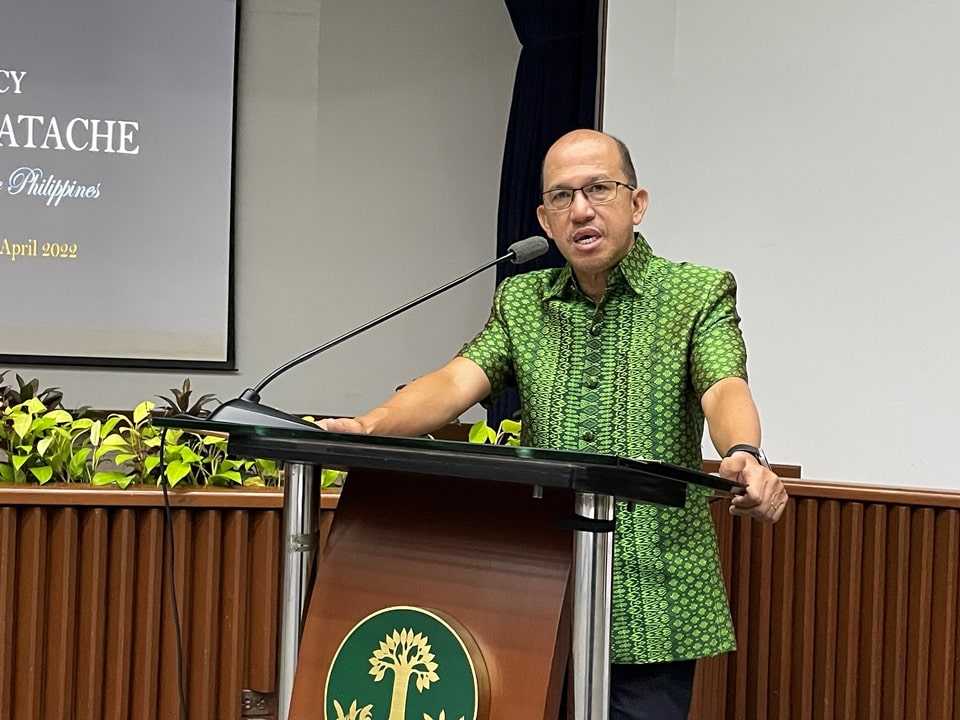 Dr. Gregorio provides an overview of SEARCA’s 11th Five-Year Plan of ATTAIN.
Dr. Gregorio provides an overview of SEARCA’s 11th Five-Year Plan of ATTAIN.
Dr. Gregorio presented an overview of SEARCA and its programs under the 11th Five-Year Plan of Accelerating Transformation Through Agriculture Innovation (ATTAIN).
“SEARCA will strive to be a leading enabler and champion of excellence in agricultural and rural development in Southeast Asia to elevate the quality of life of agricultural families through sustainable livelihoods and access to modern networks and innovative markets.”
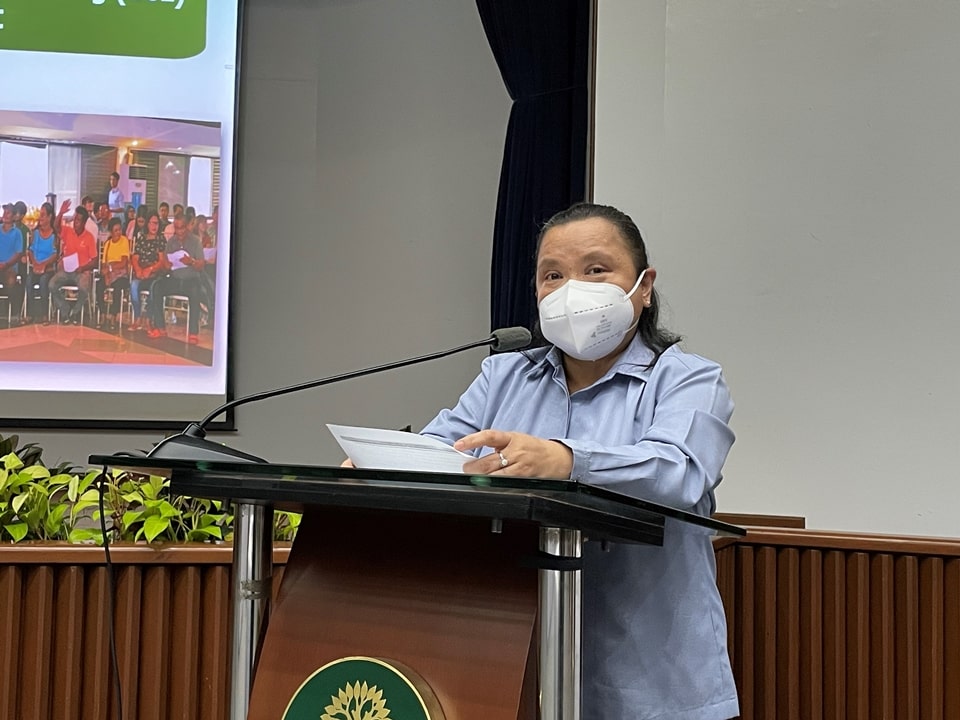 Dr. Maria Cristeta N. Cuaresma, Senior Program Head, Education and Collective Learning Department (ECLD), presents SEARCA’s current capacity building activities geared toward developing Higher Education Institutions (HEIs).
Dr. Maria Cristeta N. Cuaresma, Senior Program Head, Education and Collective Learning Department (ECLD), presents SEARCA’s current capacity building activities geared toward developing Higher Education Institutions (HEIs).
Dr. Cuaresma presented the current capacity building activities of ECLD geared toward developing higher education institutions (HEIs). This includes the efforts of the Graduate Scholarship and Institutional Development Unit (GSIDU) to create agents of change and thought leaders to transform the landscape of agricultural and rural development in their communities or respective countries and the activities of the Training for Development Unit (T4DU) that address relevant and urgent needs of stakeholders through technical trainings programs and learning modules.
SEARCA’s GSIDU also serves as the Secretariat of the Southeast Asian University Consortium for Graduate Education in Agriculture and Natural Resources (UC). It has three members in Indonesia, one in Malaysia, three in the Philippines and two in Thailand. It also has two associate members in Japan and Taiwan and two affiliate members in Canada and Germany.
“The Consortium engages in student and staff exchanges, collaborative research programs, joint or dual degrees, annual forums, summer schools and executive board meetings,” Dr. Cuaresma added.
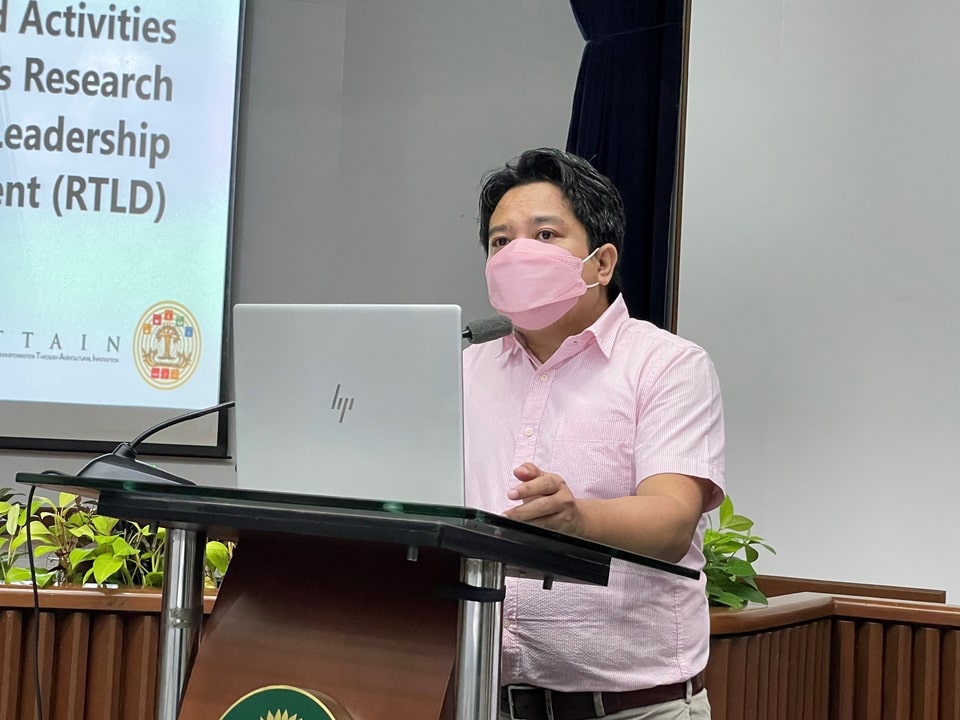 Dr. Pedcris M. Orencio, Program Head, Research and Thought Leadership Department (RTLD), presents the Center’s research projects and engagements with ASEAN bodies and regional partners in agricultural and rural development.
Dr. Pedcris M. Orencio, Program Head, Research and Thought Leadership Department (RTLD), presents the Center’s research projects and engagements with ASEAN bodies and regional partners in agricultural and rural development.
On the other hand, Dr. Orencio presented RTLD’s research projects and engagements with ASEAN bodies and regional partners in agricultural and rural development that produce knowledge and contribute to policies and programs.
The three functional areas that govern SEARCA’s research activities include the Research for Development (R4D) that comprises participatory action research and scale-up/scale-out of successful research models; Policy and Program Advisory (PPA) that provides services in terms of policy research, formulation, and evaluation as well as services that can assist lawmakers, state leaders, and farmer leaders in crafting and implementing thought leadership strategies; and Agriculture, Forestry and Natural Resources (AFNR) Knowledge Platforms that aims to create an enabling environment that will accelerate agricultural innovations by creating opportunities for knowledge sharing and learning with various stakeholders.
Dr. Orencio shared SEARCA’s School-plus-Home Gardens Project (S+HGP) that was piloted in six schools in the province of Laguna, Philippines with a model where harvests from the school gardens provided fresh vegetables for the school-based feeding program.
SEARCA, through RTLD, also provides support programs for scholars and development practitioners. The grants and fellows program are among the Center’s interventions to provide strategic capacity building and institutional development services for Southeast Asia and beyond.
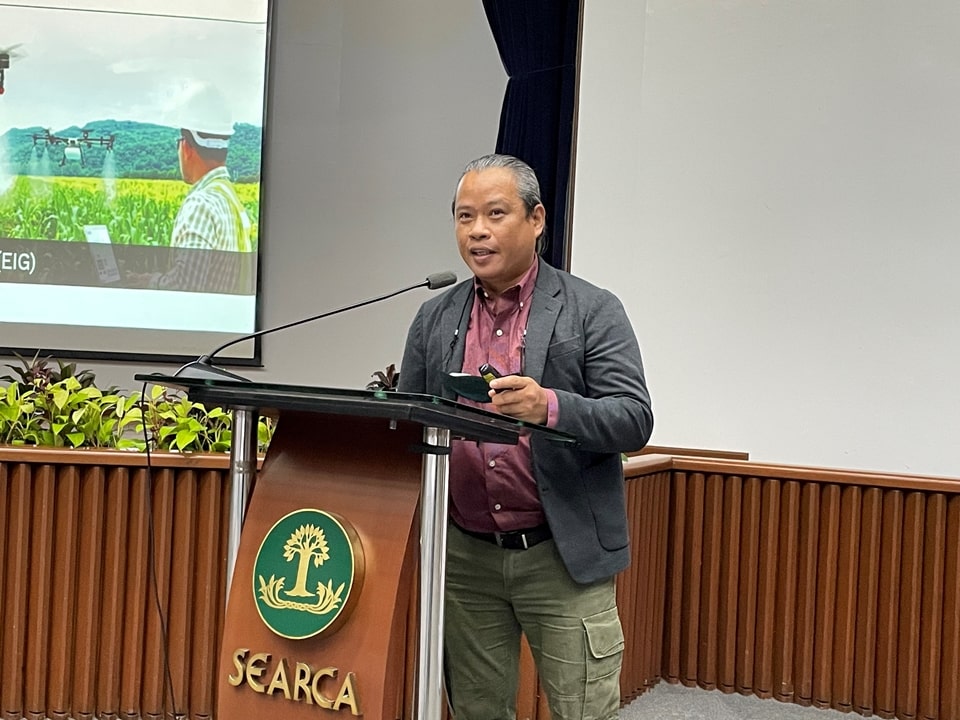 Asst. Prof. Glenn N. Baticados, Program Head, Emerging Innovation for Growth Department (EIGD), presents the SEARCA innovEIGhts model that facilitates wider access to innovative products and services, and business models for increased productivity and income of farmers and farming families.
Asst. Prof. Glenn N. Baticados, Program Head, Emerging Innovation for Growth Department (EIGD), presents the SEARCA innovEIGhts model that facilitates wider access to innovative products and services, and business models for increased productivity and income of farmers and farming families.
Asst. Prof. Baticados gave a brief overview of the SEARCA innovEIGhts model that facilitates wider access to innovative products and services, and business models for increased productivity and income of farmers and farming families.
“EIGD aims to accelerate agricultural transformation through innovation under its three units, namely, Open Innovation and Agri-Incubation, Knowledge and Technology Transfer, and Project Development, Monitoring and Evaluation,” he added.
Asst. Prof. Baticados presented the SEARCA Hub for Agriculture and Rural Innovation for the Next Generation (SHARING) Café, an interactive component of the SHARING innovation spaces, which aims to provide a creative learning experience geared towards Agriculture 4.0 in Southeast Asia.
He also shared SEARCA’s call for the Grants for Research towards Agricultural Innovative Solutions (GRAINS) that offer short-term starter funds to collaborate actions aimed at transformative innovations for more sustainable agriculture and rural development.
The Romanian Ambassador commended SEARCA for its development programs in the region and expressed her support to efforts of the Center to partner with European countries, in particular France, Germany, and Belgium. She expressed keen interest to serve as the facilitator among Southeast Asian and Romanian research and education institutions for future collaborations.
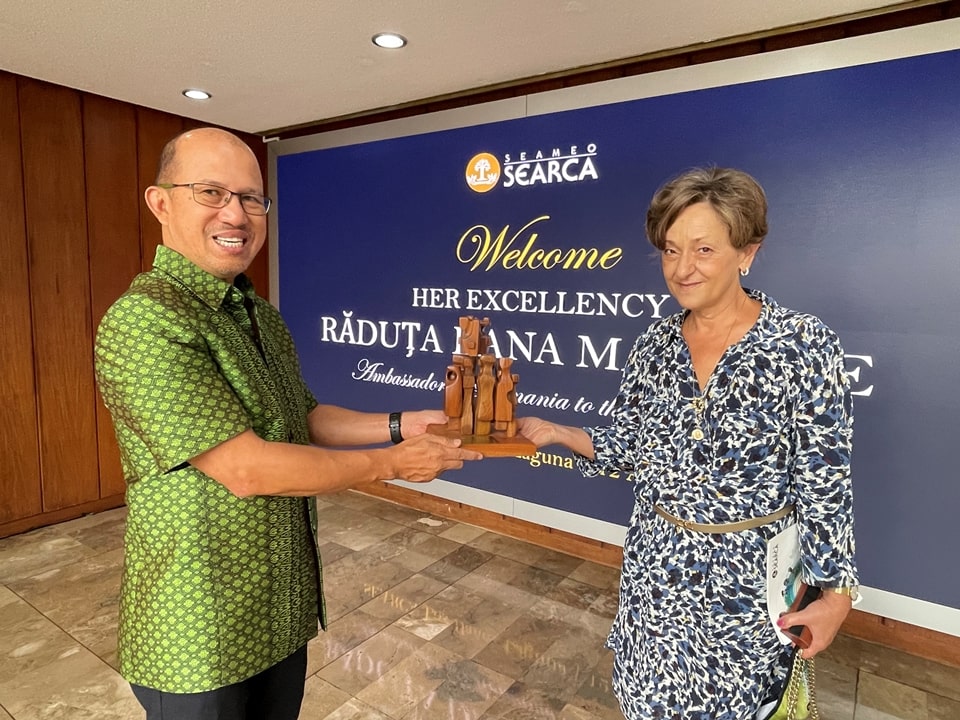 Ambassador Matache (right) holds a mini replica of SEARCA’s Growth Monument presented to him by Dr. Gregorio.
Ambassador Matache (right) holds a mini replica of SEARCA’s Growth Monument presented to him by Dr. Gregorio.
It was the first time of SEARCA to be visited by the Ambassador of Romania in the Philippines. As a token of gratitude, Dr. Gregorio presented to her a tissue culture-derived Banana Lakatan variety, a winning portrait in the SEARCA Photo Contest 2021, and a mini replica of SEARCA’s Growth Monument, which symbolizes synergy amid the diversity of the Southeast Asian nations.